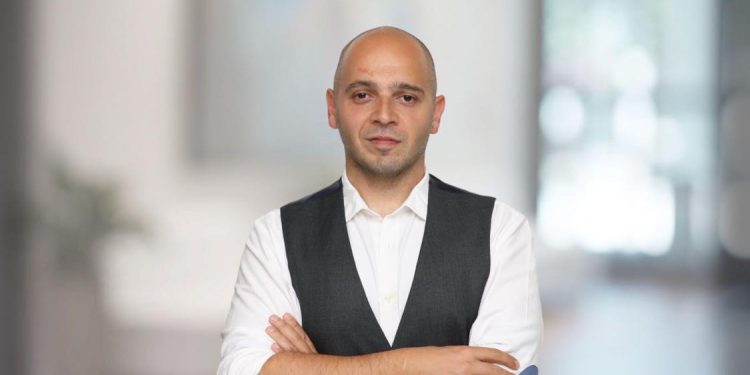COTT ELECTRONICS is a UK based company specializing in Development of Industrial Software and Hardware, the company has offices in London, HongKong, Poland and Georgia.
One of the flagship products of the company is their innovative IP Television for the Hotels, that are presented around Europe, including many Georgian Hotels.
COTT ELECTRONICS recently made two major announcements:
First, they are expanding their hospitality division into the North American markets in anticipation of the 2026 FIFA World Cup to be held in the USA, Mexico, and Canada.
Second, they are launching an Artificial Intelligence Assistant named ELLIA for hotel use. This AI enables guests to enjoy human-like interactions from their rooms, enhancing their hotel stay.
The company’s day to day operations are run by Georgian, Giorgi Gulua he serves as the COO of the Company.
We interviewed Giorgi Gulua who is currently in Los Angeles:
Tell us about your past experiences and explain how you became the Chief Operating Officer (COO) at COTT ELECTRONICS?
My journey to becoming the Chief Operating Officer (COO) at COTT ELECTRONICS has been a steady climb, largely attributed to my prior entrepreneurial experiences. Ever since I was young, I have been intrigued by the prospect of challenging existing business models and disrupting industry norms. My understanding of the business landscape is largely experiential, built from hands-on involvement over the years.
At the age of 16, I delved into the professional world, taking up a position as an IT help desk attendant at the newly formed money transfer company, IntelExpress. Simultaneously, I pursued an academic education in the Faculty of Artificial Intelligence at the Georgian Technical University.
You became Director of Intelphone by the age of 18, what’s the story behind it?
While I was working at IntelExpress, I came up with a new way of handling telecommunications. This method saved the company a significant amount of money and helped their teams around the world connect better, in a time when people were still using fax machines.
By 18, I became the Director at a Telecom Company, Intelphone, making me the youngest person to hold such a position in Georgia. Intelphone, backed by some of the same investors as IntelExpress, was a pioneer in offering local Georgian numbers as VOIP numbers to the worldwide community of Georgian immigrants and we used the same technology that I implemented in IntelExpress to cut costs.
This was in the era preceding smartphones and applications like whatsapp and viber, and we sold specialized VOIP phones that allowed customers to make calls to Georgia at local rates.
Subsequent to my time at Intelphone, I transitioned to its board of directors, that gave me time to embark on a series of my own entrepreneurial pursuits.
How receptive is the Georgian market to innovative concepts? Is it challenging to introduce a novel product in Georgia?
Many of my ventures sought to challenge the status quo of established industries.
Contrary to popular belief, I found that Georgian consumers are quite receptive to disruptive businesses.
Additionally, both the Georgian government and the private sector are supportive of innovative, bold ideas:
One of my startups, FlyWash – an on demand waterless car was company, emerged as a winner in the first batch of Startup Georgia – a government initiative aimed at fast-tracking the country’s development as part of a 4-Point Governmental Reform Plan, and we received a monetary reward.
Another one of my startups, Nusagi, an AI-based food service mobile application, won a special category award from BTU (Business and Technology University) Entrepreneurship center, where we received valuable mentoring and networking opportunities with leading professionals in the field.
Could you share some examples of the successes and setbacks you’ve experienced in your career and how they’ve shaped you professionally?
My professional path has been a blend of triumphs and challenges, each offering priceless insights. My knowledge stems from immersing myself in uncharted endeavors, necessitating swift learning and adaptation. These experiences have shaped my growth and have honed my professional skills, eventually leading me to my current role as COO at COTT ELECTRONICS, where I led design and execution of projects like HIMS IPTV, a project that is now one of the leading revenue generators for the company.
Could you elaborate on the AI assistant, its origins, and the anticipated impact it will have on the hotel industry?
AI has seen remarkable advancements over the past year, transitioning from a sci-fi concept to an everyday tool for hundreds of millions of people, regardless of their technical expertise.
Today, AI serves myriad functions, from ideation and copywriting to managing emails, drafting resumes, writing books, learning new skills and even generating compelling art, all simply through text prompts.
At COTT, we’ve always aimed to incorporate AI into our products. Gaining access to OpenAI’s early version of GPT as beta testers provided us with a solid head start and confirmed that AI was not just a tech buzzword, but a practical technology with real-world applications. After that we persistently researched and tested other AI models.
Understanding hotel challenges comes naturally to us with our innovative Hospitality TV system installed in hundreds of hotels, equating to over 30,000 rooms.
One key challenge lies in innovating in-room entertainment. For years, hotels have struggled to offer anything superior to home setups.
ELLIA is an advanced multifunctional assistant, uniquely designed to interact with hotel guests through their room’s television sets. This artificial intelligence system is uniquely calibrated for each hotel, acquiring extensive knowledge about every detail that might interest a guest.
ELLIA indeed marks a novel era in the hotel guest experience domain. could you elucidate its functionality and how hotel guests might benefit from it?
What sets ELLIA apart is its continuous learning capability. If a hotel is situated in West Hollywood, for instance, ELLIA will conduct thorough research on the locality. It delves into the internet for the most current information about the local area, forthcoming events, must-see sights, and top places to visit, storing all this data in a vector database to retrieve it rapidly when requested. Essentially, ELLIA is constantly educating itself, so when a guest poses a question in a conversational manner, as they would to a hotel receptionist, ELLIA interprets the context and responds in a similarly natural fashion.
However, this only scrapes the surface of what ELLIA can do. This AI assistant allows guests to interface with all of the hotel’s amenities. This includes mundane tasks like requesting housekeeping services or booking a spa session, but ELLIA also transcends typical hotel service provision.
To illustrate its vast potential, consider a few examples:
A guest could inform ELLIA about their culinary preferences. Based on the fare offered in the hotel restaurant, ELLIA can suggest meals. If a guest shares their mood or desired activities, ELLIA is capable of planning a day tailored to their preferences.
One particularly compelling feature is Lost and Found. If a guest misplaces an item, they can describe what they lost and its appearance. ELLIA then matches this description with items in the Lost and Found storage, promptly informing the guest if their item is there.
Indeed, ELLIA’s capabilities seem limitless. This AI system offers a personalized and convenient hotel experience, where the guests’ needs and desires are always at the forefront.
What is your involvement in the project?
My involvement in this project is quite substantial. In addition to my responsibilities as the Chief Operating Officer (COO) of the company, overseeing daily operations, I have also taken on the role of Project Manager for ELLIA. I firmly believe that integrating AI into our product line is the imminent, crucial step forward for COTT ELECTRONICS, hence my direct, hands-on engagement with this project.
As a person deeply involved in AI development, what are your thoughts and projections on the impact that AI will have on the world?
I firmly believe that we’re on the brink of a new epoch that could be compared to the era of industrialization when society transitioned from hand production to machinery.
The advent of AI is poised to create many jobs, but concurrently, it could also render several roles obsolete. This trend is already observable in sectors like advertising, content creation, and technical writing. The transition could indeed be turbulent. While AI has the potential to confer substantial benefits, it is not without its perils that need to be diligently addressed. Sam Altman, CEO of OPENAI, expressed similar concerns at a recent Senate hearing, suggesting that governments should enact regulations to oversee AI development.
There is an undeniable fact that as AI matures, its development can accelerate at a staggering pace, as exemplified by the progression of GPT models, which have demonstrated significant advancements every six months. Therefore, one thing I am certain of is that we should proceed with caution. It is essential to balance the pursuit of AI advancement with rigorous ethical standards and robust regulatory oversight. This way, we can harness the potential of AI while mitigating the risks that come along with it.
By Sofia Bochoidze














